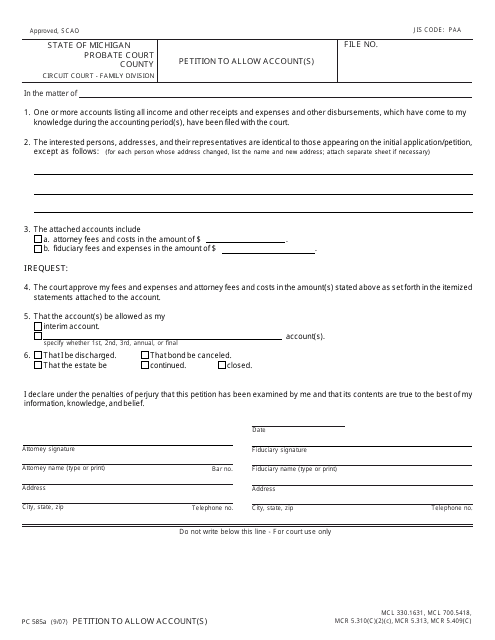This version of the form is not currently in use and is provided for reference only. Download this version of
Form PC585A
for the current year.
Form PC585A Petition to Allow Account(S) - Michigan
What Is Form PC585A?
This is a legal form that was released by the Michigan Probate Court - a government authority operating within Michigan. As of today, no separate filing guidelines for the form are provided by the issuing department.
FAQ
Q: What is Form PC585A?
A: Form PC585A is the Petition to Allow Account(s) in the state of Michigan.
Q: Who can use Form PC585A?
A: Form PC585A can be used by individuals who are seeking permission to manage the accounts of a deceased person in Michigan.
Q: What is the purpose of Form PC585A?
A: The purpose of Form PC585A is to request the court's permission to act as a personal representative or conservator for the accounts of a deceased person.
Q: Is there a filing fee for Form PC585A?
A: Yes, there is a filing fee for Form PC585A. The fee may vary depending on the county where the petition is filed. Contact the probate court for the specific fee amount.
Q: What documents do I need to submit with Form PC585A?
A: The specific documents required may vary by county, but generally you will need to submit a certified copy of the death certificate, a list of all known assets and liabilities of the deceased person, and any other relevant documents.
Q: How long does it take for the court to process Form PC585A?
A: The processing time can vary depending on the court's workload. It is recommended to contact the probate court for an estimate of the processing time.
Q: What happens after I file Form PC585A?
A: After you file Form PC585A, the court will review your petition. If approved, you will be granted permission to manage the accounts of the deceased person.
Q: Can I seek legal advice when filling out Form PC585A?
A: Yes, it is recommended to seek legal advice when filling out Form PC585A to ensure that you understand the requirements and process.
Form Details:
- Released on September 1, 2007;
- The latest edition provided by the Michigan Probate Court;
- Easy to use and ready to print;
- Quick to customize;
- Compatible with most PDF-viewing applications;
- Fill out the form in our online filing application.
Download a fillable version of Form PC585A by clicking the link below or browse more documents and templates provided by the Michigan Probate Court.


